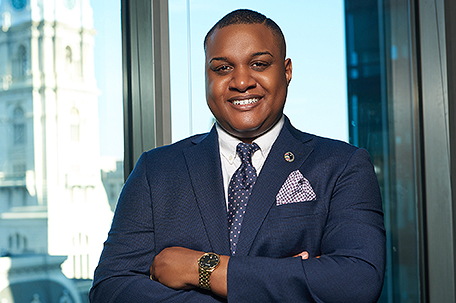
As the new president of the Philadelphia Association of Black Journalists, Ernest Owens promises to lean heavily on the organization’s tradition of advocacy.
By Denise Clay-Murray
If you’ve paid any attention at all to the media landscape both locally and nationally, you’ve probably heard of Ernest Owens.
That’s because he’s literally everywhere.
Since arriving in Philadelphia from Houston to attend the University of Pennsylvania, Owens has taken the city by storm. In addition to being an editor-at-large for Philadelphia Magazine, Owens is a contributor to the news sites The Daily Beast, and the Grio. He also has his own podcast, “Ernestly Speaking,” that you can find everywhere you get your podcasts including Apple Podcasts and Spotify. His work has also appeared in the New York Times and, depending on the topic, you can catch him on CNN from time to time as a contributor.
Owens, who runs his own media company, Ernest Media Empire LLC, earned his master’s degree in Communications Management from the University of Southern California. He’s also planning his fall wedding to Barry Johnson, a communications professional and entrepreneur.
And as of Jan. 1, 2021, Owens added one more thing to his extensive to-do list: president of the Philadelphia Association of Black Journalists. He comes to lead the organization at a time when things are changing, yet in many ways remain the same.
The SUN spoke with Owens about being president of one of the nation’s oldest advocacy organizations for journalists of color, what that advocacy will look like in a media market that’s been contracting for a while now, and why when it comes to increasing opportunities for Black journalists, he’s playing the long game.
SUN: Thanks for the time Ernest. And also, congratulations on becoming PABJ’s new president. What can the organization’s membership, and by extension the community, expect from your presidency?
EO: The first thing I would say is that it will be a presidency that will be advocacy focused. In order to really give Black media professionals opportunities and access, you have to advocate for that. We talk a lot about jobs and opportunities, but we have never really had a conversation about the inequity and discrimination in the system. I want to have those conversations. I want to fix the current system. It’s not enough to talk about jobs and internships for Black journalists if you’re not also talking about the systems.
SUN: How did you connect with PABJ?
EO: I’m not from Philadelphia, so I was looking for a community as a freelancer. When I was writing for Metro after I finished college in 2014, in 2012, [former PABJ President] Cherri Gregg reached out to me on Twitter and talked to me about becoming a member. I wanted to get involved and I built relationships. I didn’t have a community or a family in media here in Philadelphia. PABJ became that for me.
SUN: What made you decide to take on the challenge of being PABJ’s president?
EO: Well for starters, I felt like it was time-the right time for someone with my skill set and knowledge. I’m an entrepreneurial journalist, so I’m independent. I don’t work for these publications — I work with them. In this current environment, our members need to learn more of these skills, so that they’re still able to achieve fiscal and professional success, even in a pandemic. I’d like to instill the principles and focus points that can make you successful as president.
SUN: I’ve found over the years as a PABJ member that many of the best presidents we’ve had are disconnected from the larger media ecosystem here in Philadelphia because they don’t have to worry about there being consequences connected to their advocacy. For example, the chapter was able to produce a rapid response to the CBS-3 racism allegations.
Do you think that being an independent journalist gives you more room to be more of an advocate?
EO: Absolutely! I think that’s what makes me the best president of this organization at this time. The last three presidents of the organization have worked in broadcast newsrooms full-time and because of this, their hands have been tied. There were constraints on how much they could advocate. Because of my professional situation, I have the ability and flexibility to be a free speaker and defend this organization as much as I can as president. The organization needs someone who is fearless and unchained by corporate expectations. Members can expect and continue to see a rapid response from [PABJ].
This board is more entrepreneurial and independent and that makes us one of the most fearless boards that the organization has ever had. We’re following the legacy of the chapter’s founders; people like Reggie Bryant, Jerry Mondesire and journalists like Mary Mason. They were fearless. This is bigger than getting checks and positions. It’s about preserving and continuing the legacy of this organization.
SUN: You know, you’re right. Most of the new board is made up of entrepreneurial journalists. Was that intentional?
EO: Great minds think alike, I guess. Since we’re all business owners, we all get along. [Former president Manuel Smith] is the only person on the board that works for a traditional news organization. We all have had these types of mixed experiences and we bring that to our advocacy because we’re reflective of the times and we’re a modern board. Our members appreciate that, and it helps us be more relevant to them.
SUN: One thing that’s sometimes frustrating when it comes to organizations like PABJ is that it becomes like a boulder rolling down a hill: someone might push it up, but it often rolls back down. What are you hoping to leave as a legacy during your term in office?
EO: I’d like to see my legacy as one of moving newsrooms away from token gestures to where they’re making a long-term impact. What we’ve seen in the past in terms of newsroom diversity is moments rather than movement. We used to settle for that, but that’s not a real plan. I want to have real plans that are permanent and that will lead to consistent change. The goal is to get these newsrooms to be able to implement policies and plans that will have a long-term impact outside of my tenure. We’ve had a lot of nice moments and gestures. We get scholarships and fellowships and that’s okay, but it’s not long lasting, permanent policy with a permanent impact.
For example, [former two-term President of the National Association of Black Journalists and former PABJ President] Sarah Glover made a permanent impact by getting the [Associated Press] to capitalize the B in Black in copy. Locally, we need to see changes in coverage. We need mandates in terms of hiring practices. We need to see things become more equitable.
SUN: One of the organizations that PABJ has had issues with in the past is Philadelphia Magazine. I still remember two days of meetings regarding the “Being White In Philly” stories. Your presence as Editor at Large kind of shows that things are starting to improve there. And there have been other successes there. Is that experience a model that you’ll be using?
EO: I was vice president for print before I became president, so Philadelphia Magazine was under my purview. Because I was in leadership, I was able to work with them from the inside in a way that no other leader had been able to. I’m in a unique position and I’ve seen things change. They can always get better, but I’ve seen institutional change. They have a committed fellowship program that they’ve done with PABJ for the last five years and it’s a program that sets a standard for what we can do with other groups.
Publications can evolve if you speak truth to power and hold them to account. But these organizations have to be receptive to change and feedback. Philly Mag is like that now and it’s easier to work with them. We want to see this same progress with other organizations, but sometimes, the editors are too defensive with us. And because of that, they try to reinvent the wheel when it comes to diversity without having PABJ or organizations like ours in the room.
I haven’t seen success with these projects because they’ve excluded us. Progress happens when we’re involved. History has shown that these efforts won’t prosper without us.
SUN: In the past, one of the knocks on PABJ has been the perception that the organization will go after mainstream organizations that mistreat Black journalists but tend to leave members of the Black press that do the same alone. How do you respond to that?
EO: For me, it’s gloves off for everybody. The mission of this organization is the protection of Black journalists and Black media professionals in the region. I was one of the first people to champion the “Ebony Owes” movement to help freelancers that were not being paid in a timely fashion from Ebony Magazine. I used my platforms to advocate for them.
Let me be clear. No Black journalist in any newsroom will be marginalized during my tenure. I have been speaking with journalists in the Black Press and have had conversation with their leadership. We want to see change and increase outreach. We’re not going to be closed mouth about problems in our own back yard. I can’t advocate for fairness, equal pay and safe working environments in White newsrooms and leave Black newsrooms alone for doing the same things.
SUN: If I’m not mistaken, the 50th anniversary of the Philadelphia Association of Black Journalists is coming up soon. PABJ was a founding chapter of NABJ and there’s a lot of history here. Have you thought about how the chapter will be commemorating that?
EO: PABJ will be having a 50th anniversary celebration and planning for that will start this year. We’re going to have a commission made up of founders, past presidents and people that have been a part of PABJ’s history. The commission will reflect the years of leadership that I’m leaning on as PABJ’s first openly gay president and one of the organization’s youngest.
SUN: You are, to put it mildly, outspoken. The things for which you advocate, you advocate strongly and you’re unapologetic about that. While there are people who are glad there is someone leading PABJ who is unafraid to speak their mind, for some, it’s a bit much. How do you balance that?
EO: I’m part of a legacy of Black leaders who didn’t hold back when they saw injustice, so I’m not an anomaly. But a lot of people are not used to seeing young, Black men in leadership and being so outspoken. I’m passionate about advocating for Black journalists and I’m not going to apologize about that. I’m on the shoulders of giants and I see them as my guardian angels in this role. Everyone’s style is different. I have a more millennial flavor, and that’s different. You have to look at the times.
SUN: Thanks so much for giving us your time, Ernest. I really appreciate it and good luck.
EO: Thank you. [Being PABJ president] is a dream come true. I’m really excited.
Now that you’ve met PABJ president Ernest Owens, here are the other members of the executive board of the Philadelphia Association of Black Journalists:
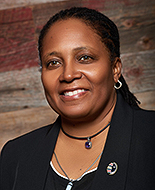
Charlene Horne, Vice President for Broadcast: Charlene Horne is beginning her second full term as PABJ’s vice president for broadcast. She had served as VP for broadcast during President Cherri Gregg’s administration and returned to the board during President Manuel Smith’s administration, first as a board member at large, then to fill the unexpired term of former VP for Broadcast Vincent Thompson. Horne is chair of PABJ’s Scholarship Committee and while she believes in the organization’s mission and how important it is for Black journalists to have an organization to advocate for them, her passion lies in creating the generation that will move journalism forward.
“Scholarships are my passion,” she said. I love the mentorship and the young people we’re working with because it’s our mission. It’s been easier because you can pull everyone in one room.
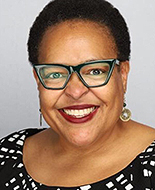
Benet Wilson, Vice President for Print: Benet Wilson is the vice president for print for PABJ. She is the chair of PABJ’s advocacy committee and has previously served on the NABJ board as the organization’s first vice president for digital and as one of the founding members of its Digital Journalism Task Force. She is also the VP for Print for the Baltimore Association of Black Journalists (BABJ).
Wilson is the credit cards editor for The Points Guy. She was previously associate editor of credit cards and travel at CompareCards.com and MagnifyMoney,com. She is founder and sole proprietor of Aviation Queen LLC, an aviation/travel freelance writing and consulting business and served as the air travel expert for About.com/Trip Savvy for four years. Her clients include Airport Business magazine, Tnooz, USA Today, AirwaysNews.com, the Runway Girl Network, Jetrader magazine, Airports Council International-North America’s Centerlines magazine and NewsCred. She writes on topics including airlines, airports, airport security, aircraft manufacturing and the passenger experience.
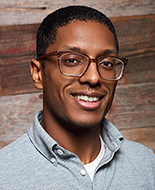
Tauhid Chappell, PABJ Parliamentarian: Tauhid Chappell is entering his first full term as PABJ’s parliamentarian. Previously, he served as secretary for the organization, but moved to parliamentarian to fill the unexpired term of former Parliamentarian Sharyn Flanagan.
Chappell, who is a board-certified parliamentarian and chair of the organization’s rules and bylaws committee, believes that his purpose within the organization is ensuring that everyone knows that they have a purpose as well.
“I want to make sure that everyone’s voice is heard in terms of programs, outreach and use of sponsor resources,” he said. “I want to make sure that everyone has an opportunity to bring their ideas to the table and I’m really looking forward to that.”
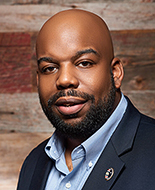
Camari Ellis, PABJ Treasurer: Camari Ellis is entering his second term as PABJ’s treasurer. He is chair of the organization’s entreprenurship committee, which is connected to the work he does with his “Wealthy Wednesdays” podcasts and videos. At a time when the Atlanta Association of Black Journalists is dealing with issues regarding the group’s former treasurer and misappropriated funds, Ellis believes that his job is to help PABJ avoid the pitfalls that other Black-owned non-profits have been hit with.
“You have to be diligent about protecting the money because it’s the chapter’s money,” he said. “This happens a lot in non-profits. They’re businesses and they should be run that way. Sadly, a lot of Black non-profits experience [things like what happened with the Atlanta chapter] because they don’t have people with the financial expertise to prevent that. People run away from it.”
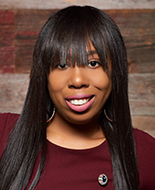
Afea Tucker, PABJ Secretary: Afea Tucker is going into her first full term as Secretary of PABJ. She became secretary last year, finishing the unexpired term of former secretary Tauhid Chappell. Tucker is an independent journalist who has contributed to the SUN and the Philadelphia Tribune. Tucker is also a staunch advocate for education and access to resources for children, teens and adults with autism and has organized PABJ’s participation in the Autism Walk.
Manuel Smith, Immediate Past President: Manuel Smith served as president of PABJ from 2018-2020. During his tenure, the organization was the recipient of grants from from the Lenfest Institute and the Independence Media Foundation designed to enhance PABJ advocacy work. Manny Smith is a managing editor at CBS Philly. Previously he was a news assignment editor with NBC 10/Telemundo 62 and is a veteran of CNBC, DailyMail.com, and the FOX News Network Desk.
















Leave a Comment